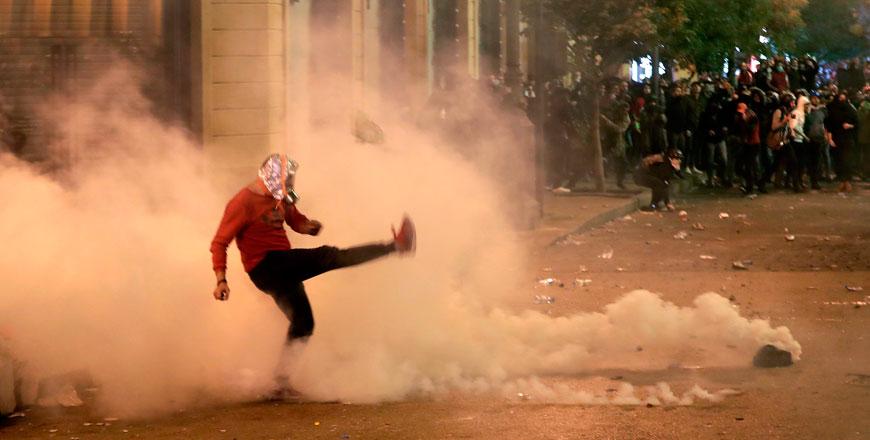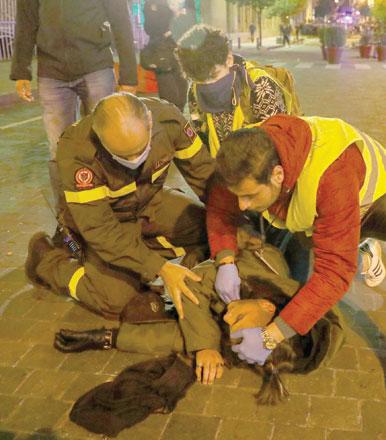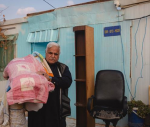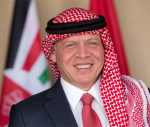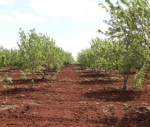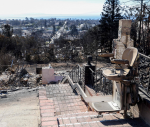You are here
Lebanon officials vow to deter 'infiltrator' attacks after weekend violence
By AFP - Jan 20,2020 - Last updated at Jan 20,2020
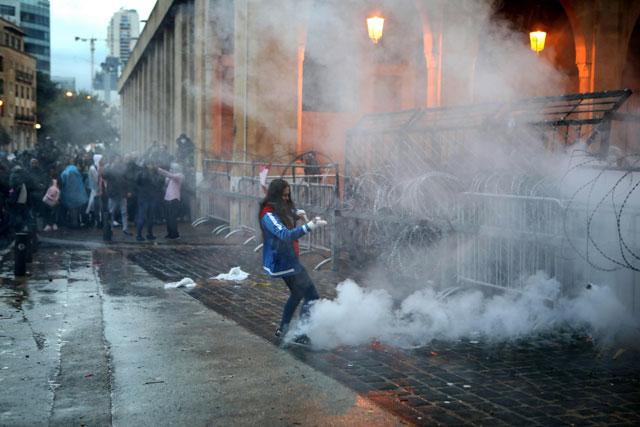
A Lebanese anti-government protester kicks back a tear gas canister fired by riot police from behind the barricaded road leading to parliament in central Beirut on Sunday (AFP photo)
BEIRUT — Security officials in protest-hit Lebanon Monday vowed to take measures to deter attacks against security forces during crisis talks following rare violence over the weekend that left hundreds wounded.
Lebanon has been rocked by mostly peaceful anti-government rallies since October 17 but the protests turned violent over the weekend amid deepening economic and political crises.
On Saturday and Sunday night demonstrators, who had called for a "week of rage", lobbed stones, firecrackers and street signs at riot police, who fired tear gas and rubber bullets to clear a road leading to parliament.
The escalation saw more than 540 people on the two sides wounded and came as wrangling delayed the formation of a new government to replace that of Prime Minister Saad Hariri, who quit last year in the face of street protests.
On Monday afternoon, President Michel Aoun presided over crisis talks on the violence between the caretaker interior and defence ministers as well as the chiefs of the military and security agencies.
Participants accused “infiltrators” of attacking security forces and vandalising property, and discussed security measures to “deter” further offences and protect peaceful protesters, a government source said after the meeting.
The source made the comments in a statement to media, but did not disclose what measures would be taken.
In a show of defiance, demonstrators who said they took part in the weekend protests responded online using the Arabic hashtag “The Infiltrator Is Me”, disclosing their full personal details.
They also accused security forces of firing rubber bullets at the eyes of protesters in other Twitter posts, as rights groups and the UN criticised police over the crackdown.
‘Brutal force’
More than 540 people, including protesters and security forces, were wounded in the weekend violence in central Beirut, according to a toll compiled by AFP from figures provided by the Red Cross and Civil Defence.
It included people who suffered “breathing difficulties” or “light injuries”, the civil defence said.
Lawyers and rights groups have condemned “excessive” and “brutal” use of force by security forces, who they said hit protesters on the head, face and genitals.
Human Rights Watch accused riot police of “launching tear gas canisters at protesters’ heads, firing rubber bullets in their eyes and attacking people at hospitals and a mosque”.
The violence also drew condemnation from the United Nations, which called the crackdown “unacceptable”.
A 22-year-old protester, who asked not to be named for security reasons, said he was severely beaten by security forces until he was bleeding in the head.
“Four of them were beating me with batons,” said the man, who has been in the hospital since Saturday.
“Then they dragged me on the ground before they started kicking me,” he told AFP.
“One of them slammed the base of a tear gas launcher against my mouth, another jabbed my face.”
‘Cycle of collapse’
Protesters had called for a week of “anger” over the political leadership’s failure to form a new government even as the debt-ridden country sinks deeper into a financial crisis.
Lebanon has been without a government since prime minister Hariri resigned on October 29 in the face of popular pressure.
Political factions agreed on December 19 to appoint former education minister Hassan Diab as the new premier but have since squabbled over ministerial posts and portfolios.
“The ruling elite is going back to its traditional bickering over their shares in government” said Bachar El Halabi a researcher at the American University of Beirut.
“This has laid the foundation for a more violent approach by initially peaceful protesters.”
Hariri on Monday said that there was an “urgent need” for a government that could steer Lebanon out of its “cycle of collapse”.
“The country is heading towards the unknown and the team responsible for forming a government is taking its time,” he said on Twitter.
Protesters have demanded a new government be comprised solely of independent experts, excluding all established political parties — a demand analysts say is a tall order.
The political impasse is worsening an already-dire economic crisis that the World Bank says may see the number of people living in poverty climb from a third to half the population.
Related Articles
BEIRUT — Lebanon has been paralysed by two months of protests demanding an overhaul of the entire political system. Here is a reca
BEIRU — Medics said 70 people were injured in renewed clashes between protesters and police in Lebanon's capital on Sunday, taking the toll
BEIRUT — Lebanon's Interior Minister Raya El Hassan on Sunday ordered the country's security forces to open a "rapid and transparent" enquir


